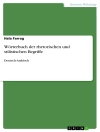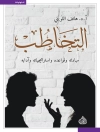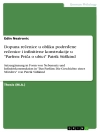Die Beiträge des Bandes fokussieren das Thema Gesellschaftswandel aus unterschiedlichen Forschungsperspektiven. Die Autor Innen verweisen dabei auf Phänomene, Trends und Kontexte der gegenwärtigen Wandlungsprozesse (Erinnerungskulturen, Migration, Familie) und neue Modi ihrer literarischen Umsetzung. Die auf Paradigmenwechsel und narrative Sonderformen rekurrierende literatur- und kulturwissenschaftliche Reflexion prägt die Analysen der deutschsprachigen Gegenwartsromane von Lilly Axster, Sibylle Berg, Maxim Biller, Christine Fehér, Karen-Susan Fessel, Inger-Maria Mahlke, Anna Mitgutsch, Martin Pollack, Julya Rabinowich, Ilse Sarecka, Norbert Scheuer, Bettina Spoerri, Wolfgang Sréter, Otto F. Walter und Natascha Wodin. Mit den Texten zu Szczepan Twardoch und Tomasz Łychowski integriert der Band auch die polnische Literatur.
The contributions contained in this volume focus on the topic of a changing society from different research perspectives. The authors refer to the phenomena, trends and contexts of current processes of transition (cultures of remembrance, migration, family), as well as the new ways of their literary realisation. Literary and cultural reflection, based on the paradigm shifts and special narrative forms, shape the analyses of contemporary German novels by such authors as Lilly Axster, Sibylle Berg, Maxima Billera, Christiane Feher, Karen-Susan Fersel, Inger-Maria Mahlke, Anna Mitgutsch, Martin Pollack, Julya Rabinowich, Ilse Sarecka, Norbert Scheuer, Bettina Spoerri, Wolfgang Sréter, Otto F. Walter and Natascha Wodin. The volume also includes the Polish issues represented by the texts on Szczepan Twardoch and Tomasz Lychowski.
Circa l’autore
Prof. Dr. Monika Wolting lehrt Neuere deutsche Literatur an der Universität Wrocław. Sie ist Sprecherin des Internationalen Christa-Wolf-Zentrums und stellvertretende Präsidentin der Goethe Gesellschaft Polen. 2020 erhielt sie die Auszeichnung des Auswärtigen Amtes »Verdiente Versöhner«.












